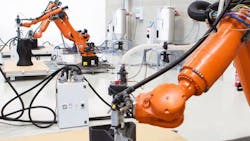Additive business sees more movement as Caracol acquires Weber assets
What you'll learn:
- Caracol acquired Weber in a move that aims to expand its product portfolio.
- The company acquired IP and machine configuration assets.
- The move is part of recent repositioning and M&A activity in the additive marketplace.
Another merger and acquisition marks more movement in the additive manufacturing marketplace as Caracol, a leader in large-format additive manufacturing, announced it had acquired machine configuration assets from Germany's Hans Weber Maschinenfabrik in a move that aims to expand the large-format additive ecosystem.
See also: Caracol opens new facility in Texas
Italy's Caracol revealed last month that it had acquired IP and robotic machine configuration assets from Weber, a German player in extrusion technology.
The Caracol move comes in a busy 18 months of repositioning and M&A activity in the additive marketplace, especially by Nano Dimension, Desktop Metal, Stratasys, 3D Systems and other players.
Q&A: Roadmap to Industry 5.0 with Ganesh Bukka of Hitachi Digital Services
The Caracol deal is part of the company’s broader investment strategy in Europe, leveraging Weber’s strong foundation in Germany, Austria and Switzerland to ensure the continent’s top industrial players have access to leading technologies and services, expanding on a shared vision from both companies of the future of industrial production, Caracol said in a Sept. 24 release.
“This agreement combines heritage with innovation, by two companies united by shared values: progressiveness, engineering excellence, and a customer-centric mindset,” said Francesco De Stefano, CEO and co-founder of Caracol.
This agreement combines heritage with innovation, by two companies united by shared values: progressiveness, engineering excellence, and a customer-centric mindset.
- Francesco De Stefano, Caracol CEO and co-founder
“It allows us to strengthen the technological roadmap of two best-in-class technologies, ensuring each can best fit specific customer’s industrial needs. On the one hand, Caracol’s expertise of the full turnkey technological ecosystem, process, and deep vertical application know-how. On the other, Weber’s core expertise on extrusion and machinery manufacturing.”
See also: How manufacturing tech changes challenge the depleted workforce
According to the release from Caracol, the deal had two main goals: to integrate Weber’s additive technology into Caracol’s portfolio of products to create a more comprehensible large-format ecosystem, addressing a range of customer needs; and to reinforce the industrialization of large-format technology across manufacturing sectors.
The deal is part of a larger investment strategy for Caracol to expand throughout Europe. Caracol’s service network spans 55 countries, and the acquisition should help develop extrusion technology and support product development for the company’s product portfolio, according to Caracol.
“Thanks to the partnership with Weber, Caracol clients will be able to access Heron platforms with a broader level of customization and configurations to satisfy their specific industrial needs. This means also additional options when it comes to automation—such as Siemens control or ABB robots,” De Stefano said.
See also: Turning workforce challenges into digital opportunities
The partnership of Caracol and Weber is the latest step in the comings and goings of additive companies, as the deal between the two was announced a week after Arc Public Benefit Corp., a New York-based investment company, bought Desktop Metal out of bankruptcy for an undisclosed sum. Arc officials named longtime Desktop Metal Chief Operating Officer Thomas Nogueira as the reformed company’s CEO.
Video: Desktop Metal charts a new course out of insolvency, toward profitability
Just two years ago, additive—or industrial 3D printing—was a hot investment, and major companies announced several multibillion-dollar mergers—almost all of which collapsed before consummation.
Last year, Nano Dimension agreed to buy Desktop Metal for $183 million but almost immediately tried to back out of the deal. Desktop Metal then sued, forcing the completion of the sale, and Nano Dimension quickly forced its newly acquired subsidiary into bankruptcy proceedings, seeking at various points to liquidate its former partner instead of letting it reorganize.
Arc officials say the reformed Desktop Metal will focus on defense, automotive and aerospace parts—combining binder-jet metal and ceramic printing, production-grade polymer platforms and AI-assisted materials development.
About the Author
Sarah Mattalian
Staff Writer
Sarah Mattalian is a Chicago-based journalist writing for Smart Industry and Automation World, two brands of Endeavor Business Media, covering industry trends and manufacturing technology. In 2025, she graduated with a master's degree in journalism from Northwestern University's Medill School of Journalism, specializing in health, environment and science reporting. She does freelance work as well, covering public health and the environment in Chicagoland and in the Midwest. Her work has appeared in Inside Climate News, Inside Washington Publishers, NBC4 in Washington, D.C., The Durango Herald and North Jersey Daily News. She has a translation certificate in Spanish.

